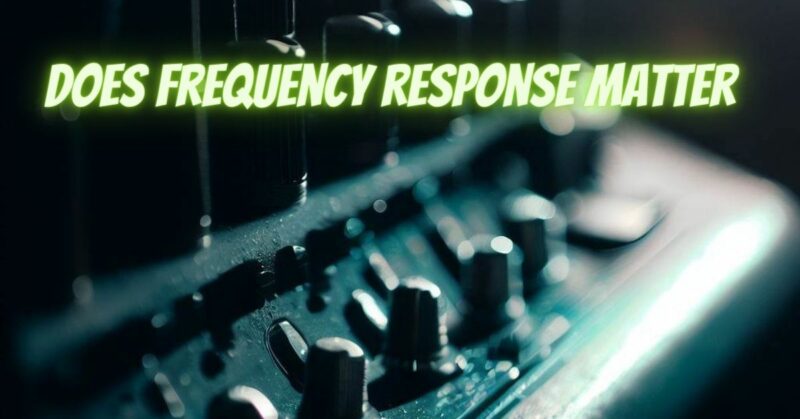Frequency response is a critical aspect of audio reproduction, influencing how an audio device, such as speakers, headphones, or amplifiers, handles different frequencies across the audible spectrum. Understanding frequency response is essential for audio enthusiasts, musicians, and professionals who seek accurate sound reproduction and a pleasant listening experience. In this article, we will explore the importance of frequency response in audio systems and how it affects the overall sound quality.
Understanding Frequency Response
Frequency response is a measurement of an audio device’s ability to reproduce different frequencies within the audible range. The audible spectrum spans from approximately 20 Hz (low bass) to 20 kHz (high treble), covering the range of sounds perceivable by the human ear. The frequency response of a device is usually represented as a graph, showing how it responds to different frequencies.
Importance of Frequency Response
- Sound Accuracy: A flat and even frequency response is vital for accurate sound reproduction. An audio device with a flat frequency response reproduces each frequency with equal clarity and volume, resulting in a faithful representation of the original audio signal.
- Balanced Sound: A balanced frequency response ensures that all frequencies are reproduced in proper proportion, providing a balanced and natural sound. If certain frequencies are emphasized or attenuated, the audio may sound skewed, lacking in detail, or muffled.
- Music Reproduction: For music enthusiasts, a proper frequency response is crucial for experiencing music as the artists intended. An accurate frequency response allows listeners to hear all the nuances of the instruments and vocals, immersing them in the music.
- Audio Mixing and Mastering: In professional audio settings, a flat and precise frequency response is essential for accurate audio mixing and mastering. Engineers rely on faithful reproduction to make informed decisions about equalization, dynamics, and spatial effects.
- Personal Listening Preferences: Some audio enthusiasts may have personal listening preferences, such as a slight emphasis on bass or treble. In such cases, they may seek audio devices with a tailored frequency response to suit their taste.
Factors Affecting Frequency Response
Several factors influence the frequency response of audio devices, including:
- Speaker Design: The design of speakers, such as driver size, materials, and cabinet construction, significantly affects their frequency response.
- Headphone Design: Headphones with different driver types, open-back or closed-back designs, and ear cup materials can produce varying frequency responses.
- Amplifier Design: The design and components of an amplifier can affect its frequency response and how it interacts with the connected speakers or headphones.
Frequency response is a crucial factor in audio reproduction, directly impacting the accuracy, balance, and overall sound quality of audio devices. For accurate sound reproduction and a satisfying listening experience, it is essential to consider the frequency response of speakers, headphones, and other audio equipment. A flat and even frequency response ensures faithful sound reproduction, making it easier for listeners to appreciate the nuances of music and audio content. However, personal listening preferences and specific applications may also influence the choice of audio devices with tailored frequency responses to suit individual tastes and needs. Whether for casual listening or professional audio work, understanding frequency response is fundamental for achieving the desired sound experience.


